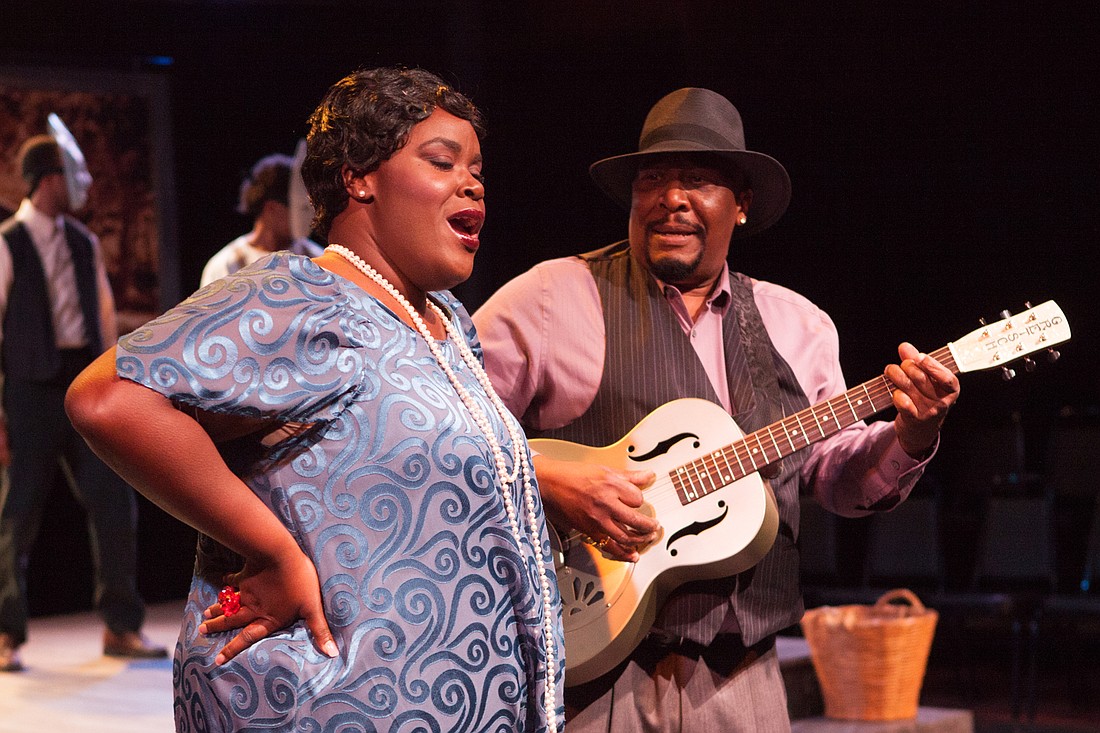- December 21, 2024
-
-
Loading

Loading

“Spunk” is now working its spell on the Westcoast Black Theatre Troupe stage. It’s a faithful adaptation of three short stories by Zora Neale Hurston, the Harlem Renaissance writer and folklorist. Playwright George C. Wolfe reworked her words; Chic Street Man wove his bluesy tunes around them. Great tunes, but tales are the play’s beating heart. Tales, as in stories told. Hurston’s stories have the flavor of speech; it isn’t lost in theatrical translation.
Hurston’s trio of tales triangulate the primal bonds of men and women — sex, love, power and money. These stories are simultaneously staged and spoken; the actors take turns telling the story like relay racers handing off a baton. Blues Speak Woman (Deidra Grace) and Guitar Man (Sammy Blue) introduce the tales like a two-person Greek chorus singing the blues.
“Sweat” unfolds an abused wife’s unlikely triumph over her estranged thug of a husband at her north Florida farm. Delia (Candace C. Culcleasure) takes in laundry — and a lot of physical and mental abuse from Sykes (Yohance Myles). He despises Delia, because she’s skinny, because she does white people’s dirty work, and because he’s just plain mean. Sykes concocts a sadistic scheme exploiting Delia’s snake phobia to seize the farm for himself. But he’s a snake of a man who gets bitten.
“Story in Harlem Slang” is a 100-proof shot of intoxicating, Zoot Suit-era lingo that would put a smile on Anthony Burgess’ face. Basically, it’s a pimp showdown in the days when “pimp” meant “gigolo” in Harlem’s streets. (The play comically stops the action to clue the audience in on the definition.) Myles and Earley Dean Wilson III play two preening peacocks who start with a verbal battle, nearly fistfight, and wind up vying for the affections (and paycheck) of a maid on her day off. The two begin as losers and wind up that way, but the linguistic fireworks display is a winner. Here, Joel Patrick King is the narrator, firing up his “coal pot” (pipe, that is) and telling us the score in hipper-than-hip patois.
“The Gilded Six Bits” returns to north Florida for a tale about a happy young couple (Myles and Culcleasure, again). They’re giggly, in love and still playing games and digging each other’s bodies. Their home is another kind of Eden, and as we all know, that place has always had snake troubles. This time, the serpent (King) is a fat blowhard dripping in fake gold coins. Paradise is lost, but it’s found again.
As noted, this play’s a show and tell; you hear the tales and see them. Jim Weaver directs this hybrid happening with a light touch and perfect pacing. He gets the verbal music right — and the actual music right, too. It’s great theater, done well, but not overdone.
The troupe’s performers are all on their A-game. These mercurial actors turn into different characters at the drop of a hat and never miss a beat. Steve Patmagrian’s set, Michael Pasquini’s lighting and Cristy Owen’s period costumes walk the line between realism and magic. Kudos also to Sammy Blue and Deidra Grace for the bluesy web of music tying it all together.
Hurston’s tales are deeply rooted in the African-American experience of a specific time and place. But they’re also everybody’s stories. (It’s a weird rule of storytelling: The more specific you make the story, the more universal is becomes.) Spunk proves that rule with two simple human truths:
Regardless of race, creed or color, we all get the blues. Spunk is the life-force that keeps us all going, even when we’re crying the blues.
You can’t get more universal than that.